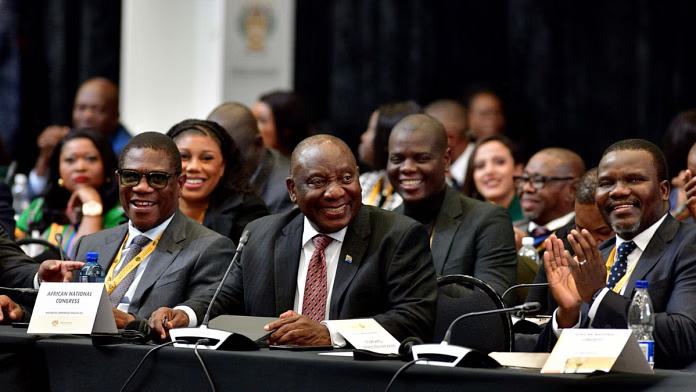Cyril Ramaphosa Re-Elected as South African President Amidst Fragile Coalition

Quicktake:
- Election Outcome: Cyril Ramaphosa re-elected as South African President.
- Coalition Government: ANC forms coalition with Democratic Alliance, Inkatha Freedom Party, and Patriotic Alliance.
- Impact on Crypto: Re-election unlikely to significantly impact South Africa’s crypto industry.
- Regulatory Developments: Recent licensing regime established for digital asset firms.
South Africa has re-elected Cyril Ramaphosa as President under the African National Congress (ANC) banner, marking a new chapter in the country’s political landscape. This election has resulted in South Africa’s first multi-party coalition government, a significant shift from the ANC’s long-standing dominance since the end of apartheid in 1994.
The ANC, which has ruled for three decades, managed to secure only 159 seats in this election, falling short of the 200 needed for a majority. Consequently, after extensive negotiations, the ANC formed a coalition government with the centrist Democratic Alliance, the Inkatha Freedom Party, and the smaller Patriotic Alliance. This coalition, known as the government of national unity, marks a significant departure from the ANC’s previous stronghold when it held 230 seats in the prior parliament.
Despite this political shift, the re-election of Cyril Ramaphosa is not anticipated to have a major impact on South Africa’s emerging crypto industry. The country’s Financial Sector Conduct Authority (FSCA) has recently established a licensing regime for crypto firms, positioning South Africa as one of the leading African nations in digital asset regulation.
In April, South Africa began licensing digital asset firms, with companies like Luno, Zignaly, and VALR among the first to receive licenses. This regulatory framework follows the inclusion of crypto providers in the Financial Advisory and Intermediary Services Act in 2022, which allowed digital assets to be regulated as financial products.
The country’s Intergovernmental Fintech Working Group is also actively exploring the potential use cases for stablecoins, considering a policy and regulatory response expected later this year, and examining the implications of tokenization. These efforts demonstrate South Africa’s commitment to integrating digital assets into its financial ecosystem, despite the broader political changes.
Moreover, in April, South Africa initiated consultations on a directive that would include crypto transactions in the country’s Travel Rules. Once this directive is published in the gazette, it will require virtual asset service providers to transmit information about wallets and passports when making transfers. This move aims to enhance transparency and security in crypto transactions, aligning with global standards for digital asset regulation.
Cyril Ramaphosa’s re-election, despite the ANC’s reduced majority, provides a stable backdrop for the continued growth and regulation of the crypto industry in South Africa. The coalition government, while fragile, is expected to maintain the momentum in regulatory advancements and support for the digital asset sector.The ANC’s need to form alliances reflects the evolving political dynamics in South Africa, but it also underscores the resilience and adaptability of the country’s governance structures. The inclusion of diverse political voices in the coalition government could foster a more inclusive approach to policy-making, potentially benefiting the broader economic landscape, including the burgeoning crypto industry.



